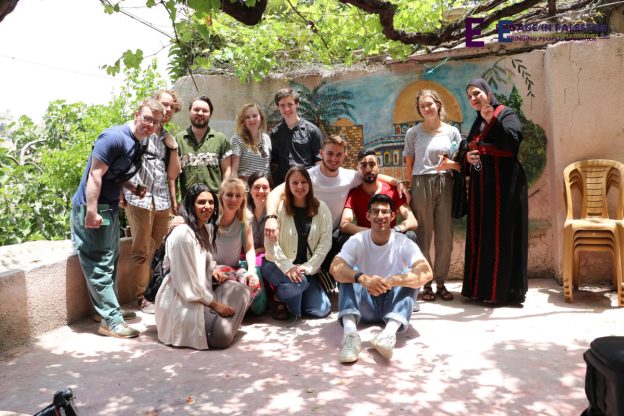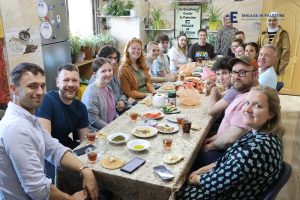6 Reasons to Visit West Bank, Palestine: Expressing a wish to visit Palestine may lead to surprised reactions from those around you. Of course, it is one of the holiest places in the world and there are beautiful sites to visit, but it is a zone of conflict after all. Some people struggle to comprehend the wish to travel to a region that is known mostly for bad news and receives negative attention from the media
However, behind the headlines of violence and conflict lies a land containing many treasures to uncover. Palestine is rich in culture, and it has a fascinating history and vibrant society, all of which make it a top destination for any traveler.
If you are an intrepid traveler, with a desire to learn, readiness to be surprised, and a willingness to open your mind and experience a different culture, Palestine is an unforgettable travel destination.
Table of Contents
1. Hospitality of the People
You will hear ‘You are welcome’ from a passerby on the street at least once a day. This friendly greeting expresses the pleasure of having foreigners come to experience the homeland of the Palestinians. Hospitality is one of the few goods that are not scarce in Palestine and it is something you cannot take away from the Palestinians – it seems to run through their veins.
There is no point in trying to rush during your stay in the West Bank, Palestine! Many of the locals you meet will immediately invite you into their homes for tea or a meal with their family. Palestinian culture revolves around visiting family and friends and making newcomers part of the circle is a priority. Refusing is impolite- and why would you refuse anyway? Take these offers of hospitality as wonderful opportunities to connect with the local people and gain a unique insight into their lives. The warm-hearted, spirited people of Palestine will conquer your heart.
2. Good Food
The culinary connoisseurs among us will already know that Middle Eastern cuisine is delicious and becoming increasingly popular. Palestinian food is typically fresh and healthy. You won’t find any frozen dinners or canned soups, and fast food is far less common than in a Western country. Produce is a staple of most snacks and meals, and is often fresh from the garden.
“I watched my host take the tray into the garden to pick fresh mint leaves for the tea! It was so good,” said one international.
Many products are locally sourced, and if you’re lucky enough to spend time with a Palestinian family, you’ll sample a variety of delicious homemade dishes.
Middle Eastern and in particular Palestinian cuisine is praised in many new cookbooks, with good reason. Cookbooks will, however, never be able to give you the experience of eating authentic shakshouka, mujaddara, or qidreh, made by Palestinians, in the heart of Palestine. So, seat yourself in a restaurant and be prepared for deliciousness and a lot of olive oil.
For a quick bite, you can find shawarma’s falafels and kabobs that you will come back to in your dreams on any street corner. For those with a sweet tooth, Hebron is heaven on earth, as it is called Palestine’s capital of sweet treats. Its kunafah (cheese-stuffed pastries) is famous and spread from Palestine to the rest of the Arab world and the West.
There is something for everyone here, so what are you waiting for?
3. Religious, Historical, and Special Sites
Palestine and its surrounding areas have significance for people all over the world. It is the Holy Land, the cradle of the three major monotheistic religions. The numerous sites spread over Hebron, Nablus, Ramallah, Jericho, Jerusalem, and the surroundings will teach you about this history.
The Ibrahimi mosque in the old city of Hebron, for example, is sacred to Christians, Jews, and Muslims as it is believed to be the burial site of Abraham, Sarah, Isaac, Jacob, Rebecca, and Leah. Jericho is considered to be the setting of the Old Testament’s Battle of Jericho and home to several significant archaeological sites.
The Church of Nativity in Bethlehem is thought to be the birthplace of Jesus. Jerusalem harbors the Al-Aqsa Mosque, the Church of the Holy Sepulchre, the Western Wall, Via Dolorosa, the Temple Mount, and many others. The atmosphere of these holy places takes you back to bygone times. Afterward, you can let it all sink in while you are floating in the Dead Sea, buying souvenirs at the souk, or smoking hookah.
4. Learning the Political and Cultural Ins-and-Outs
Conflict and oppression are part of Palestinian daily life. We understand that your knowledge of Palestine is likely to have come from news and media outlets and that the impression they give is often unfavorable. We realize that many travelers will have reservations about coming to the West Bank. It is true that, as an Occupied Zone, Palestine has its problems and complications, but international visitors are without exception surprised about the sense of safety in Palestine.
The fact that the occupation is all-around makes Palestine an interesting place for anyone wishing to understand more of what is going on. During your stay in Palestine, you will get to meet locals who endure the occupation every day and see how they live. Many people are eager to discuss the political situation with travelers, so do not hesitate to ask questions.
There is, however, more to learn than politics. The mix of religions, the significance of olive trees, the family-oriented culture, and typical Palestinian weddings and birth celebrations make it well worth your while to immerse yourself in Palestinian culture. For the ‘Western’ traveler, the rules of conduct between genders may come across as conservative. What is considered normal and friendly at home may be interpreted as flirtatious here.
Foreign female visitors are wise to be a little more careful in their interactions with men, to prevent unwanted attention. However, it is relatively easy to adapt and adhere to the social and cultural norms here. Visitors who show respect for the cultural mindset when it comes to modest clothing and behavior can count on being welcomed with open arms and feeling comfortable.
5. Humanitarian Opportunities to Do Good
In the West Bank, 31% of Palestinians live in refugee camps. In Gaza, this is 42%. The day-to-day life of Palestinians is hampered by the occupation in many respects. Palestinian children and youngsters have ambitions and aspirations for a better life.
They are eager to learn and improve themselves and the position of their community. Foreigner volunteers and interns can play a significant role in bettering the prospects of the Palestinians in many ways such as teaching English, organizing community events, or raising awareness and making it known to the world that Palestine is not what traditional media outlets often make one believe. All of these things can have a positive impact on many. Visiting and volunteering in Palestine is a way to give back to the world and make it a better place. Here you may find the list of our volunteers and internships program in Hebron, West Bank:
Contrary to the concerned opinions of those around you, there is more to Palestine than conflict. During your visit, you will be warmly welcomed by the Palestinian people, served delicious food, see magical historic sites, experience Palestinian cultural and political life, and be able to make a positive impact on the prospects of the Palestinian people. So, pack your bags and get ready to be enchanted by this holy place.
6. Study Arabic in Palestine
The West Bank, Palestine is a wonderful place to learn, study, and practice Arabic. At Engage in Palestine, we offer courses in the following types of Arabic:
- Classical Arabic (Fusha Arabic)
- Modern Standard Arabic (MSA)
- Shami or Levantine Arabic (known as Amiyya and spoken in Palestine, Israel, Jordan, Syria, and Lebanon.)
- Colloquial Palestinian Arabic (the dialect spoken in Hebron, known locally as “Khalili”)
- A mixed program (MSA, Colloquial Palestinian Arabic, Levantine Arabic)
Here you may find the list of Arabic immersion programs in West Bank, Palestine
If you would like to familiarize yourself with Palestinian Arabic before your arrival, there are many resources available, including online learning programs, videos, and books. YouTube is a wonderful source of videos on basic Palestinian Arabic phrases.
Local Palestinians will be delighted to practice Arabic with you, and many volunteers work to familiarize themselves with basic greetings and phrases before their visit. Taxi drivers and shopkeepers will likely speak very basic English, but a sizable proportion of the Palestinian population is well-educated and speaks good English fluently. However, expect English proficiency to decline as you move farther away from the urban centers.
Contact Us
Should you have any questions, please do not hesitate to contact us at:
WhatsApp:+972 599 479 880
Website: https://ecpalestine.org/
EC Website: https://excellencenter.org/
Instagram: https://www.instagram.com/excellence.center
Facebook page: https://www.facebook.com/ExcellenceCenter
Tags: Study Arabic in the West Bank, Visit and intern in the West bank, Volunteer in Palestine



